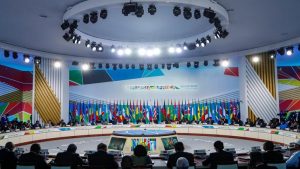Last week, food security became one of the domineering themes at the Russia-Africa Summit held in the cosmopolitan city of St Petersburg.
The summit attracted global media attention as well as the developments in the fractious geopolitical relations of our times.
Forty-nine African governments were represented at the two-day summit. They were led by the African Union Chair, Azali Assoumani, who is also the President of the Comoros.
Taking place amidst an unprecedented barrage of western sanctions and isolation campaign against Moscow, the summit was nonetheless well attended and was marked by a convivial spirit of comradeship and camaraderie.
Among the key resolutions of the summit was the proposal for a speedy establishment of the four-year “Russia-Africa Action Plan” that would enhance efficient cooperation between Russia and the continent.
Among the immediate outcomes of the summit was Russia’s resolve to partner Africa in various fields including education, where Moscow would invest in the provision of scholarships for Africans to study in Russia.
Russian companies would also spread their wings throughout the continent, particularly in the fields of energy, cyber security, economics, development and capacity building through public sector training, President Vladimir Putin said during his keynote address.
Among other key takeaways was the signing of a total 161 non-secret agreements, most of them on tech-sharing and international trade. “The share of the Ukrainian grain on the world markets is less than 5%, while the share of grain from Russia is more than 20%,” Putin said. He bemoaned the prevention from shipping 300,000 tons of Russian fertilizers out of EU ports, fertilizers that were being shipped free of charge to Africa to enhance food security.
SA’s President Cyril Ramaphosa’s presence at the summit was equally prominent. “As African countries, we are shaping our own destinies, as nation states and as a continent,” Ramaphosa said, before adding: “Respect and mutual benefit underpin our international relations.” On the “Action Plan”, he said: “We should ensure joint monitoring and evaluation of the Action Plan. We need to jointly allocate the necessary funding for implementation and be accountable for concrete deliverables.”
As the current occupants of the BRICS presidency, Pretoria is scheduled to host a much-anticipated summit of the strategic bloc in the third week of August.
No wonder Ramaphosa and his Russian counterpart, Putin, managed to squeeze in a bilateral face-to-face meeting on the side-lines of the summit. The two heads of state met at the Konstantinovsky palace in St Petersburg. They discussed issues of mutual interest, particularly multifaceted cooperation.
Earlier, speaking during a plenary session of the summit, President Ramaphosa appeared to sum up the essence of the meeting quite poignantly when he stated: “In the intervening years (since the last Russia-Africa summit three years ago) we have experienced strong geopolitical and economic crosswinds.”
Economic upheavals were of course caused by the advent of the COVID-19 pandemic that disrupted processes and systems in the manufacturing and services industries, among others.
The outbreak of conflict in Ukraine emanating from Russia’s concerns over the countries national security Moscow feared was being endangered by the expansion of NATO eastward remains the world’s biggest geopolitical conundrum.
Ramaphosa has repeatedly voiced his concern over the growing challenges precipitated by food insecurity attributed to the Ukraine conflict.
“As South Africa,” Ramaphosa told the summit’s plenary session, “we are greatly encouraged by the Russian Federation’s commitment to deepening collaboration with the nations of Africa.”
The ties between Russia and the continent date back to the Cold War era when the former Soviet Union provided military and material support for several of Africa’s liberation movements, including SA’s African National Congress that has ruled democratically since 1994 when apartheid officially ended.
Ramaphosa put it more in perspective when he said: “As South Africa, we remember with deep gratitude how the support of the people and the government of the then Soviet Union sustained our struggle for liberation.”
Some of the prominent ANC and SA Communist Party bigwigs that underwent military training in the former Soviet Union were JB Marks and Moses Kotane. The two stalwarts actually died in Russia – Marks on August 1, 1972 and Kotane on May 19, 1978 at a Moscow hospital.
The two were given heroes’ send-offs and laid to rest at the Novodevichy cemetery in Moscow. In March 2015, the ANC-led government led the process that ended with the remains of two heroes exhumed and returned to SA to be re-interred. Marks now finally rests at his birthplace in Ventersdorp (since renamed JB Marks Local Municipality). Kotane rests eternally in the backyard of his homestead in his beloved Pella village, also since reclassified under the Moses Kotane Local Municipality.
Russia’s bilateral relationship with SA is strong, as is the case with most of the continent. “We continue to collaborate (with Russia) in the political, economic, social, defence and security spheres,” Ramaphosa said.
He added: “African countries should, as sovereign states, be able to pursue independent foreign policy approaches that are not beholden to any of the major global powers or blocs.”
President Ramaphosa’s ideals are encouraging indeed. However, they would require a major shift in the continent’s often fragmented approach to global affairs.
The colonial-era divide-and-rule tactic used by the western imperial powers to weaken the continent has sadly continued to wreak havoc through modern Africa. Unity of purpose continues to be one of the biggest challenges that the AU faces, and the visible ideological divide between various regional blocs is also a worrying phenomenon that has held back Africa’s development and impact in geopolitics.
An initiative such as the Russia-Africa Action Plan, and the intended collective monitoring and evaluation as proposed by President Ramaphosa, should be supported by a united AU.
Abbey Makoe is an independent freelance diplomatic writer. He attended the Russia-Africa summit in St Petersburg.






